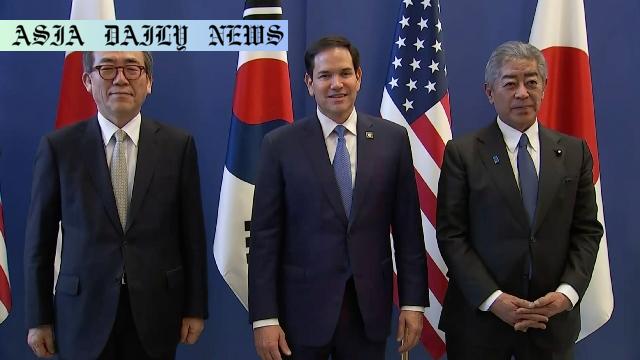Diplomatic Cooperation: Japan, US, and South Korea unite to address North Korea’s nuclear threat and evolving global challenges.
Japan, US, South Korea meet during NATO discussions.
Collaboration to address North Korea’s nuclear ambitions.
Concerns raised over China and Russia’s increasing ties with North Korea.
Debates on unilateral tariff changes with the US-Japan trade relationship.

Renewed Focus on North Korea’s Nuclear Threat
During a pivotal assembly held on the sidelines of the NATO foreign ministerial meeting in Belgium, representatives from Japan, the United States, and South Korea convened to strategize a unified response to growing concerns about North Korea’s nuclear and missile programs. These talks bring a sharpened focus to existing tensions, as Pyongyang continues to escalate its military capabilities, further alarming the global community.
Japanese Foreign Minister Iwaya Takeshi, US Secretary of State Marco Rubio, and South Korean Foreign Minister Cho Tae-yul confirmed their shared concerns surrounding Pyongyang’s deepening cooperation with Russia—a factor that poses multidimensional challenges to global peace and security. The trilateral meeting not only underscored the importance of solidarity but also aimed to bolster coordinated efforts among NATO allies and partners when addressing global security crises. These joint efforts signal a firm stance against unilateral decisions or alliances that destabilize international order.
Geopolitical Maneuvers: The China Factor
Conversations were not limited to North Korea alone. The three nations also reflected on potential threats posed by unbalanced geopolitical maneuvers in East Asia, particularly keeping concerns over China’s growing influence in mind. The possibility of altering the global status quo by force remains a critical issue, requiring a coordinated front among nations who prioritize stability. Japan’s role as an essential ally in bridging efforts between NATO and the Asia-Pacific was highlighted, further cementing its contribution to strategic dialogues on such pressing matters. By recognizing the interconnectedness of regional and global security, the meeting showcased an acknowledgment that diplomacy must act as the first line of defense against power struggles in the region.
Trade Tensions Between US and Japan
Amid these discussions, bilateral trade disputes between Japan and the United States surfaced, hinting at underlying economic tensions that could impede future collaborations. Minister Iwaya expressed regret during his private exchange with Secretary Rubio regarding President Trump’s announcement of new tariffs, especially the reciprocal 24-percent tariff levied on Japanese imports. These measures, coupled with additional tariffs on Japanese automobiles, may strain economic ties and overshadow the positive strides made during the trilateral discussions on security.
Minister Iwaya strongly advocated for the review of these levies, emphasizing the principle of fairness and the potential ripple effects such tariffs might have on global trade. Practical steps toward resolving these strains will be fundamental to ensuring strategic and economic partnerships remain intact as the three nations navigate diplomatic cooperation in an increasingly complex world.
Conclusion: Strategic Cooperation Amid Challenges
The tripartite discussions at the NATO ministerial meeting underscore the importance of maintaining strong alliances amidst regional and global uncertainty. Japan, the US, and South Korea’s cooperation in addressing North Korea’s destabilizing actions presents a united front against emerging threats. However, as geopolitical and economic challenges persist, it remains vital for these nations to employ deft diplomacy, ensuring that both shared and individual interests are effectively balanced. Only through enduring dialogue and precise coordination can they hope to navigate the complexities of the current global landscape.
Commentary
Importance of Trilateral Alliances in Addressing Global Concerns
The recent trilateral meeting among Japan, the US, and South Korea shines a spotlight on the enduring significance of international cooperation. In a world marked by geopolitical volatility, these alliances act as a vital mechanism for fostering peace and stability. By focusing on collective security concerns such as North Korea’s nuclear ambitions, the three countries illustrate a powerful commitment to preserving order in the face of growing challenges.
However, these meetings are only the beginning. Efforts to confront and address Pyongyang’s actions require prolonged, consistent alliances between NATO partners and Asia-Pacific nations. The deepened collaboration among these nations serves both as a warning to the aggressors and reassurance to allies globally that shared goals can unite nations with historically unique strategic priorities. This particular meeting at NATO carved a crucial channel of sustained engagement to counter current threats and emerging military cooperation between Russia and North Korea.
The Role of Trade in Diplomatic Relationships
Even as these nations align strategically, the unresolved trade disagreements between Japan and the US serve as a stark reminder of the complexities tied to such partnerships. Tariffs imposed by the United States, particularly on Japanese goods and automobiles, could erode trust that has been built through years of collaboration. Minister Iwaya’s concerns are valid and underscore the potentially adverse impacts of economic decisions on broader diplomatic relationships. Transparent conversations and careful renegotiations, such as the ones initiated here, must play an instrumental role going forward.
It’s crucial to ensure that economic policies do not overshadow progress made on the security front. Diplomacy is about balance—a ceaseless balancing act between leveraging strategic interests and fostering trust. While North Korea’s looming threat remains an urgent priority for Japan, South Korea, and the US, economic stability will remain a key player in determining the durability of these partnerships.
Final Reflections on Bridges Across Continents
The strategic meeting reminds us that only through enduring dialogue, multilateral actions, and a shared vision for peace can nations hope to navigate an increasingly interconnected world. The inclusion of China and Russia as peripheral yet critical concerns strongly emphasizes that alliances cannot operate in isolation. Future discussions must continue to holistically address both regional and global impacts to keep progress sustainable. The foundation of this trilateral relationship is strong, and with dedicated engagement, it has the potential to influence pathways for global peace significantly.


